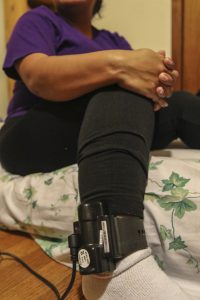Electronic monitors, such as GPS ankle shackles, are sold to the public as a way to reduce prison populations and end mass incarceration. In reality, these monitors are a form of E-Carceration: the use of technology to deprive people of their liberty.

Electronic monitors (EM) don’t reduce incarceration, they simply move the location of incarceration from jails and prisons to our homes and communities.
Corporations are deeply involved in this business, charging expensive fees for monitors. Among these EM profiteers is the nation’s biggest private prison operator, the GEO Group, which is also the owner of the largest monitoring company, BI Inc.. We need to keep an eye on GEO’s efforts to expand the electronic monitoring net and stay updated on wider EM news to resist E-Carceration.
Here are four pieces of recent news on electronic monitoring:
1. London Breed, aspiring mayoral candidate in San Francisco, CA, is pushing a measure which would eliminate court fees charged by the city, including fees for EM.
“Some of the most expensive costs targeted by the legislation are linked to probation and electronic monitoring,” the article states. “People on probation pay an average of $50 per month to that department, and those on electronic monitoring must rent an anklet for roughly $35 a day…” At $35 a day, these monitoring charges are likely the highest in the country.
2. A new Bibliography on Electronic Monitoring has been added to the Challenging E-Carceration website. This bibliography is one of the most comprehensive listings of analytical writing, research documents, and news stories on electronic monitoring found online. The bulk of the research for this bibliography was done by JustLeadershipUSA.
3. A steady stream of dystopian technology is emerging, sparking new ideas about where monitoring is heading. One example of this new technology is Amazon’s latest wrist watch, which tracks warehouse workers’ locations and provides “tactile feedback” to guide the worker’s hand to the right shelves. Looking ahead, this technology could be applied to provide “tactile feedback” to “correct the behavior” of the criminalized population.
4. Rebecca Brown, founder and director of Reentry Solutions Group, was featured in a Teen Vogue interview on the stirring campaign in Contra Costa County, CA to halt juvenile fees for EM and other court “services.”



